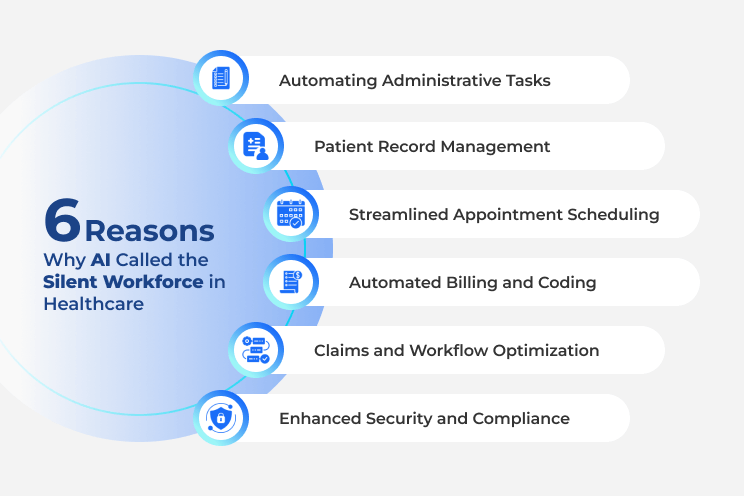Predictive analytics means using advanced AI and machine learning to look at large amounts of past and current data. This helps find patterns and trends that might not be clear to people. In healthcare, it looks at patient records, diagnoses, appointment schedules, medication use, hospital stays, staff levels, and insurance claims to predict what might happen in the future.
By using predictive analytics, clinics can guess how many patients will come in, figure out how many staff they need, spot patients who might get sicker, and plan their resources better. This can help patients get care sooner and lower costs by avoiding too much or too little staffing.
The Role of Predictive Analytics in Small Practices
Predictive analytics has been common in big hospitals, but it is now easier for small clinics to use. These small practices often compete with bigger ones, but AI tools help improve how they work and how they connect with patients.
Some key benefits for small clinics include:
- Forecasting Patient Demand: Times like flu season or when chronic diseases get worse can bring many patients at once. Predictive models use past data to guess future patient numbers. This helps clinics schedule staff and appointments better.
- Resource Optimization: Knowing how many doctors and helpers are needed prevents overtime costs or staff burnout. Staff schedules can fit patient needs, making service better.
- Improved Patient Interventions: Predictive analytics can find patients who might need extra care early. For example, people with diabetes or heart problems can get more check-ups or medicine reviews to avoid hospital visits.
- Reducing Wait Times and Bottlenecks: The technology predicts busy times and helps change appointment schedules. This lowers patient waiting and reduces missed or canceled appointments.
- Financial Benefits: Using resources well reduces waste and improves income by managing billing and insurance claims better. Predictive analytics helps get payments faster and lowers denied claims.
AI and Automation in Workflow Management for Small Healthcare Practices
Besides predictive analytics, AI-based automation helps make daily healthcare tasks easier. Front-office automation like phone answering, scheduling, and patient communication frees staff from repeated tasks. This lets them focus more on patient care.
Simbo AI is one example of a company that offers AI phone automation. Their tools can handle patient calls all day and night. This reduces office staff workload and makes care easier to reach.
Automated workflows can include:
- Appointment Scheduling and Reminders: AI virtual assistants let patients book, change, or cancel appointments without staff help. Reminders sent by text or email lower missed visits and help patients keep up with appointments and medicine.
- Insurance Verification: AI checks insurance coverage quickly, speeding up patient check-in and avoiding delays from errors.
- Patient Data Management: AI gathers and updates patient info in electronic health records, giving doctors easy access to care plans, prescriptions, and medical history.
- Billing and Claims Handling: Automation improves billing and claims by catching mistakes that cause denials. This helps clinics get money faster and reduces appeal work.
- 24/7 Patient Support: AI chatbots and phone systems answer common patient questions, medication concerns, or urgent problems any time, increasing patient contact outside office hours.
Using AI tools like those from Simbo AI helps small clinics lower admin work, make fewer errors, and talk better with patients. It also helps follow privacy rules like HIPAA that protect patient data.
Predictive Analytics and AI Automation: Practical Applications in U.S. Small Practices
Small clinics in the U.S. can improve by using predictive analytics and AI automation in these ways:
- Staffing and Scheduling Optimization: Predictive models look at past appointments to guess how many patients will come in. This helps set doctor schedules right, avoiding too few or too many staff. For example, a small clinic might find that visits rise in the middle of the month because of insurance schedules and plan for it.
- Preventive Care and Chronic Disease Management: AI can spot patients likely to get sicker and alert care teams. Clinics can schedule follow-ups or medicine checks early. Big systems like Mercy Health use this to improve care and lower staff work.
- Enhanced Patient Communication: Automation sends regular emails and texts to patients. These reminders help them take medicine and keep appointments, lowering missed visits.
- Faster Provider Enrollment and Credentialing: Predictive tools make provider sign-up faster, so clinics can bring in new doctors quickly.
- Financial Management: AI billing systems cut mistakes and deny fewer claims. Faster claim processing keeps money flowing, which is important for small clinics.
Addressing Challenges When Implementing AI and Predictive Analytics
Even with benefits, small clinics should watch for challenges when using AI and predictive analytics:
- Data Quality: Good, consistent data is needed. Bad or scattered data can cause wrong predictions and choices. Small clinics should keep records accurate and use standard data entry.
- Integration with Existing Systems: Many small clinics use old electronic health record or practice management systems. New AI tools must fit in well to avoid work problems.
- Privacy and Compliance: Laws like HIPAA protect patient data. Clinics must make sure AI tools follow these rules to keep patient info safe.
- Training and Staff Engagement: Successful AI use means involving workers in design and giving enough training. This helps avoid pushback and makes tools work better.
- Scalability: Starting small with easy-to-manage goals and tools helps clinics avoid costly mistakes and grow AI use over time.
Examples of AI Impact in Healthcare Administration
Big healthcare groups like Mercy Health have shown how AI automation saves time by handling appointment confirmations and insurance checks. This improves patient care and lowers admin work. Companies like Salesforce offer AI tools that handle routine tasks while keeping data safe, making advanced tech usable by smaller clinics.
Other companies, like Keragon, provide no-code AI platforms that work with more than 20 electronic health record systems. These platforms help automate scheduling, intake, communication, billing, and data analysis. They reduce admin tasks, improve efficiency, and keep clinics compliant with rules.
Simbo AI helps small clinics with front-office automation by offering 24/7 AI answering services. These handle patient calls, questions, and appointments quickly and with little delay.
Benefits Beyond Patient Care
Using predictive analytics and AI automation helps small clinics not only with patient care but also with how the clinic runs. It:
- Makes workflows smoother and cuts down on admin work.
- Helps staff feel better by lowering repeat tasks and allowing more patient interaction.
- Supports money management by improving billing and speeding up payments.
- Makes small clinics more competitive with bigger systems by improving how they operate and care for patients.
Final Thoughts
For people running small healthcare clinics in the U.S., predictive analytics and AI automation offer ways to improve patient care and manage resources better. Using AI tools that forecast needs and automate daily tasks lets clinics work more smoothly, keep patients happier, and stay financially stable in today’s healthcare world.
Using services like Simbo AI for phone automation and scheduling, along with predictive analytics that help with staff and resource planning, small clinics can handle many admin problems. This lets them focus more on what matters—giving timely and personal care to people in their communities.
Frequently Asked Questions
How can AI help small healthcare practices with administrative tasks?
AI can automate routine administrative processes such as scheduling, billing, and appointment confirmations, allowing staff to focus on patient care, minimizing administrative burden, and enhancing operational efficiency at small practices.
What are the benefits of AI-powered virtual assistants in healthcare?
AI-powered virtual assistants can handle patient queries 24/7, send personalized reminders about appointments and medications, and improve patient engagement while lightening the load on staff.
How does AI assist in patient data management?
AI can gather and analyze patient data quickly, offering healthcare providers real-time access to care plans, prescriptions, and records, improving decision-making and patient care delivery.
What role does predictive analytics play in small healthcare practices?
Predictive analytics enables small practices to optimize resource allocation and ensure timely interventions by forecasting patient demand based on historical data.
How can AI improve patient communication?
AI enhances communication through automated emails and SMS updates, ensuring timely delivery of relevant information in the patient’s preferred format, boosting patient satisfaction.
Why is data quality crucial in AI healthcare applications?
High-quality, standardized data is vital for AI efficacy; poor data leads to inaccurate outcomes and may adversely affect patient care and operational decisions.
What are the common pitfalls when implementing AI in healthcare?
Common pitfalls include lack of clear clinical workflow integration, overlooking data quality, neglecting privacy requirements, failing to involve frontline workers, and not planning for scalability.
How does AI enhance scheduling for small practices?
AI streamlines scheduling by enabling patients to book appointments online easily, reducing administrative workload, and improving the overall patient experience.
What impact does AI have on provider enrollment and billing?
AI accelerates provider enrollment processes and optimizes billing and claims, resulting in faster reimbursements and reduced denial rates, enhancing financial management.
How can AI help small practices compete with larger health systems?
By utilizing AI, small practices can improve operational efficiency, enhance patient engagement, personalize care, and streamline administrative tasks, enabling them to compete effectively with larger health systems.
The post Predictive Analytics in Small Healthcare Practices: Optimizing Resource Allocation and Improving Patient Interventions first appeared on Simbo AI – Blogs.







